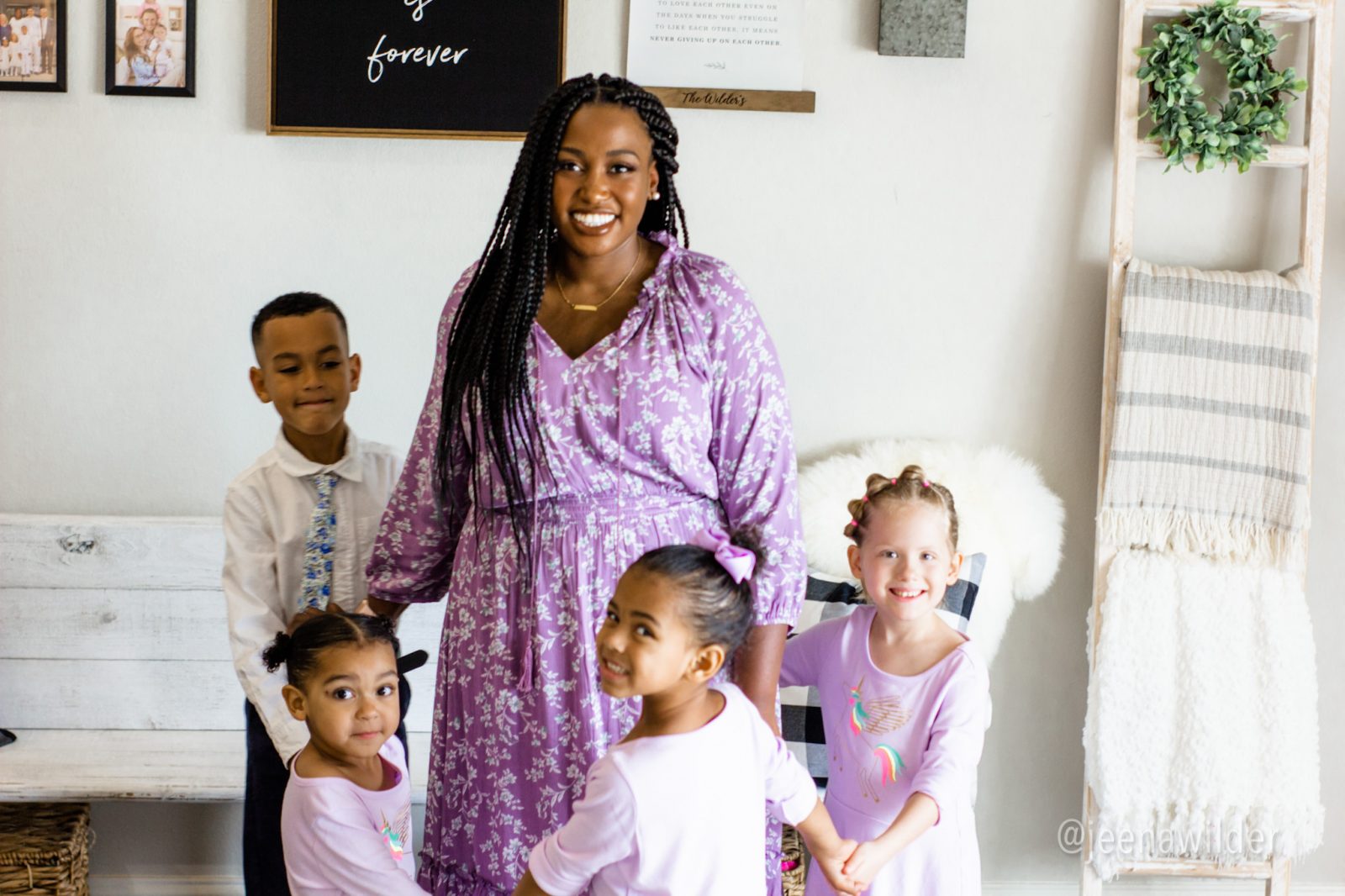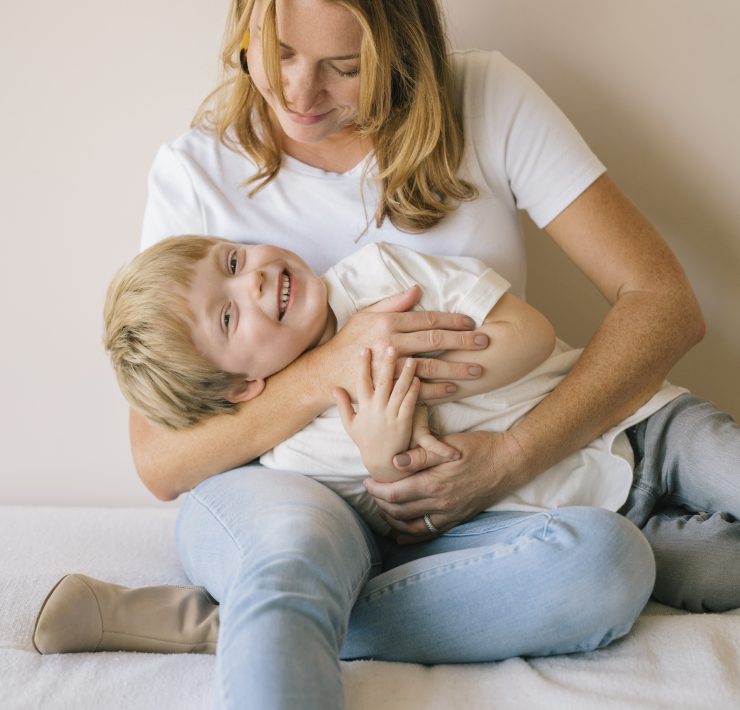
"I see color, but I've never seen it as a reason why you can't do something or hang out with someone or be someone's mother."
Influencer Jeena Wilder is mom to four – three biological, biracial babes and one blonde haired, blue eyed daughter through adoption. Jeena recently chatted with Raise co-founder Jessica Butler about her daughter’s transracial adoption, how she explains her difficult adoption circumstances in an age appropriate way, and why more Black families should be adopting.
On transracial adoption.
During the process, it didn’t occur to me that ours was a transracial adoption because I have biracial children. I see my daughter, I know that she’s white, but I don’t think I put two and two together, if that makes sense. It wasn’t until the adoption was final that I realized, this is really big. I want to make sure that I know as much as I can in order to help her be the best person she can be. And one of the first things I needed to do was to accept and realize that this is a transracial adoption. Even though I don’t see her differently from my other children, it is different, and I know there will be a point where she realizes that I am different from her. When that time comes, I hope she sees me as a person she can talk to and learn from.
For me, the hardest part of transracial adoption is the comments and DMs that I get from other people after I post a picture of my family. “Why not a Black child? Why did you feel like you needed a white child?”
I love my daughter to pieces. I love everything about her. But I did not specifically choose a white child.
Most people who make those comments have never even thought about adoption, let alone gone through the process. But for some reason their words hurt so much, and make me feel like I need to explain myself.
I knew when I was a teenager that I wanted to adopt. My husband wanted to adopt. We wanted to love a child who needed parents — that’s all we said yes to. We never said, “Yes, but only to a white child with blonde hair and blue eyes.” I see color, but I’ve never seen it as a reason why you can’t do something or hang out with someone or be someone’s mother. I love my daughter to pieces. I love everything about her. But I did not specifically choose a white child.
Some people comment that we’re doing it for show. It’s not for show. It’s hard. Adoption comes with trauma, even in the best of circumstances. But I am not more special than anybody else. I hate when people say, “You’re so wonderful for doing this.” I’m just a mom taking care of four children, dealing with the things that every mom deals with.
On raising bi-racial children.
Even before we adopted our daughter, I was doing the work. My husband and I are an interracial couple. I did a lot of things to make sure that our children understood that they are both Black and white, and that both are important. If I only taught them about my culture, it would show them that Black culture is the only one that matters, and I don’t think that’s true, especially for my children.
White culture is everywhere, but it still requires work on my part to make sure that my white daughter sees that I celebrate it. That’s why I make an effort to show both. We eat the foods that my husband’s family eats, along with the ones my family eats. We make sure that our kids don’t just hang around my side of the family, but his side too.
On honoring your adopted child’s birth family.
No matter what, your child has a past, even if you adopted them at birth. They have a biological mother, a biological father, and relatives that are a part of them, even if they never meet those relatives. If you deny that and say, “No, that’s my child,” it’s like you’re cutting out a part of them. They are your child, but denying their past is like saying, “My part of you matters more, and I’m cutting out the other part of you because it makes me feel uncomfortable.” That’s really what it boils down to. It makes you uncomfortable. It makes you feel like you’re not enough.
Trust that your kid is going to love you. That they’re going to see you as their parent. If you just do what’s best for them, they’re always going to choose you because they will see how much you love them.
On her advice to adoptive and foster families.
Therapy. For both your children and you.
Our daughter came to live with us when she was three, and she had gone through a lot of trauma. My husband and I knew from the beginning that we were going to use therapy, but we waited about six months, in order to watch her and see how her trauma was manifesting, and to reassure her that Mommy and Daddy were never going to leave her.
In the beginning, whenever one of us left the room or went outside to grab the mail, she would start crying. She followed us around inside the house, so we decided to let her know, for a really, really long time, that we would always be there. We didn’t have any babysitters during those first six months, which was really hard because we like date nights. But we decided that one of us was always going to be home. It was a long six months, but it was worth it. Eventually she was comfortable enough to trust someone besides us, so we started therapy.
When she came to live with us, I had just given birth about seven months before, so I still had a baby, and it was hard. My daughter cried A LOT, and I didn’t know how to deal with it or how to help her. It would get me really frustrated, and I didn’t want to be frustrated at her, and I just didn’t know what to do. Therapy gave me the tools to help her and to understand what she was going through.
It also gives her someone she can talk to in the future. There will be times when she’s working through things where she might feel like she has to pick between me and her biological mother, and I don’t ever want her to feel like that. If she can’t talk to me, I want to make sure she has someone to talk to.
On explaining the difficult circumstances of her daughter’s adoption.
Our daughter’s biological parents are unable to take care of her. There’s nothing you can say to make that a positive. But from the beginning, we have always told her, “Your mom and dad love you. They love you so much. And if they could be here to be take care of you they would be, but they made a bad choice, and they can’t be with you right now. That doesn’t mean that they don’t want to be, it just means that they can’t be. So now you have two moms and two dads that love you so much.” We’re just honest with her, but in age appropriate terms.
Obviously, as she gets older, she’s going to ask more questions, and we will gauge where her maturity is and what she can and can’t handle with her therapists. But I made sure that she knows the truth — her parents do love her. I know that without doubt.
On forgiving her daughter’s biological parents.
In the beginning, I was so frustrated with her father, who is my husband’s brother. Just so frustrated with the circumstances that lead to our daughter’s adoption, but every single time we would talk, he would speak to my heart by saying, “Thank you. Thank you for taking care of her. Thank you for treating her exactly like your other kids. Knowing that she’s with you makes it a lot easier.”
Forgiveness is hard. There may be a time when you have to step back and take a break from it. Take your time. If they did something wrong, if they hurt your child, any person would be angry. That’s normal. Forgiving them doesn’t mean that you’re okay with that they did, but it makes a huge difference in your heart. I don’t know how to even explain it, but forgiving her parents made me open my heart to loving my daughter even more, and I already loved her a lot.
On changing the stigma of adoption in the Black community.
One of the things I realized as a Black mom and an adoptive mom, is that there are not a lot of other Black adoptive families. Only 6% of adoptive families are Black, compared to 77% white. There’s a huge stigma about adoption in the Black community, and honestly, it angers me. The general belief is that you should step in to take care of your niece or nephew or grandchild, but you shouldn’t formally adopt them. And you shouldn’t adopt children, period. There’s no reason for you to.
But there is a reason. What usually happens, when you don’t adopt that niece or nephew, is that a person who shouldn’t be taking care of them comes back, takes the child back, and uproots them again. If things are done legally, that doesn’t happen.
We need more Black families adopting.
There are more Black children than white children in the foster care system. If a white couple adopts those Black children, they can face a lot of backlash – why did you do it? White Savior? But Black families aren’t adopting those children either, because of the stigma, so those children are just left in the system.
I feel like we should be approaching this issue the same way we’re approaching Black lives matter. We need to lay it all out. This is happening, and this is the issue. I don’t think we need to deal with it in a delicate way. I think people need to say, “We need more Black families adopting.” And that’s what I did in a post a couple of weeks ago. I said, “I don’t understand why Black families are not adopting, but we need more Black families adopting. I’m not saying you have to adopt a white child like I did. I just want you to adopt, period.”
I want Black families to learn more about adoption. So many people tell me they can’t adopt because they heard it’s expensive. Adopting from foster care is 100% free. In some cases, you can receive financial aid after the adoption. You can get help with health insurance. Money should not be the reason you don’t adopt.
On normalizing modern families.
In 2020, families are looking so different. Mine looks nothing like the traditional family, but my kids don’t know anything different. They love how our family looks!
You can follow Jeena’s beautiful family at @jeenawilder or on her blog heytherewilders.com.
Jessica Butler is the co-founder of Raise, stepmother of two, and adoptive mother of one. Prior to Raise, she was a writer on USA’s "In Plain Sight" and TNT’s "The Last Ship." She and her husband, writer/producer Warren Bell, co-created the Nick at Nite series "Instant Mom," based on her life as a stepmother. She lives in Los Angeles with her husband and six-year-old son, Levon.



My granddaughter is being adopted by a black womanly who is very kind. This was a well written article